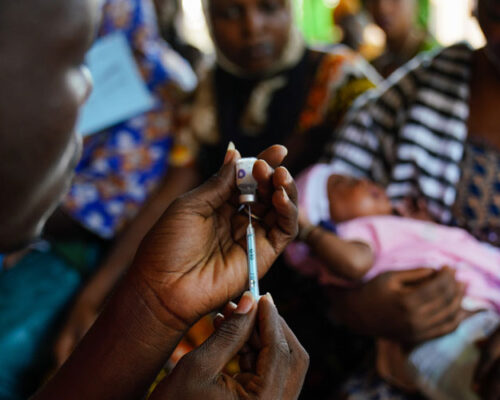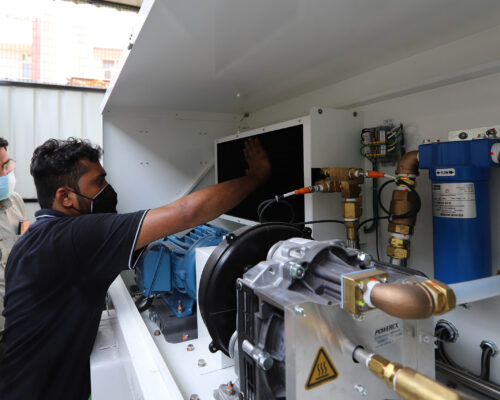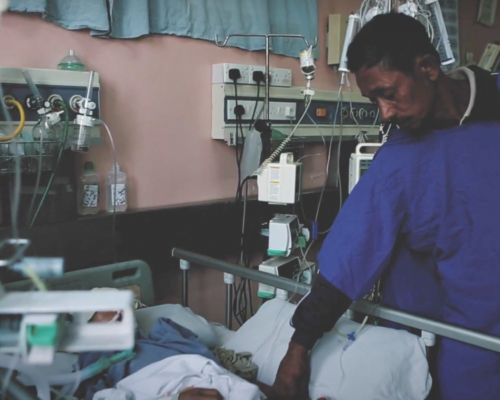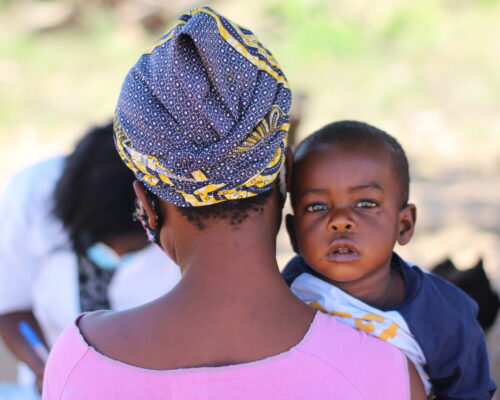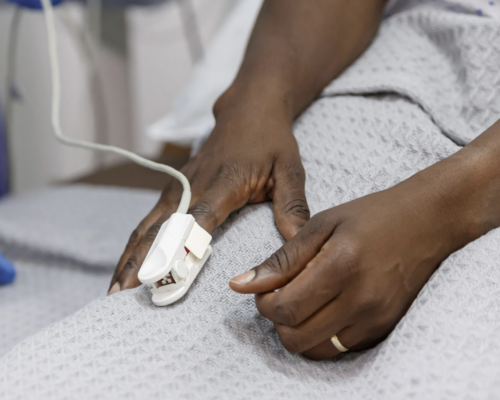
World Pneumonia Day 2023
Pneumonia is the single biggest infectious killer of adults and children – claiming the lives of 2.5 million, including 672,000 children, in 2019. This year, World Pneumonia Day, on 12 November 2023, we are taking stock of progress.
Vaccination
60% of children are now protected with one of the most powerful pneumonia-fighting vaccines – the pneumococcal conjugate vaccine, or PCV. A dramatic increase in coverage (almost ten percentage points) has been achieved in the last two years as India and Indonesia roll out this vaccine. With other countries losing many children to pneumonia poised to introduce the PCV – including Chad, Guinea, South Sudan, and Somalia – the global target of 90% coverage by 2030 is getting closer.
Nutrition
Almost half of all babies in the world are being exclusively breastfed in the first six months of life bringing the Global Nutrition Target of 50% by 2025 within reach. Child malnutrition, and especially wasting, is the greatest risk factor for death from pneumonia among children. Women need a lot of support to breastfeed exclusively for six months. They need to maintain a healthy diet, workplaces that enable breastfeeding and/or pumping and storage, access to pumps and other breastfeeding supportive technologies, and supportive family members.
Air pollution
More than 70% of households now use clean fuels and technologies for cooking reducing the risk of household air pollution-related pneumonia deaths. In 2019, household air pollution contributed to 423,000 pneumonia deaths and is the leading risk factor for death from pneumonia across all age groups. Children are more susceptible to household air pollution in homes that regularly use polluting fuels and technologies for cooking, heating, and lighting.
Pulse oximetry and medical oxygen
Pulse oximetry and medical oxygen are now more available than ever before, especially in low resource hospitals, due to the support that was provided during the COVID-19 pandemic. The international oxygen emergency response mobilized more than $US1 billion to help more than 100 low- and middle-income countries increase access to pulse oximetry and oxygen. Those same countries are now repurposing the COVID-19 equipment to meet the needs of other patients in their healthcare systems from the tiniest newborn in respiratory distress, to the elderly patient with COPD.
Child survival
Most countries (72%) are actually on track to achieve the Child Survival Sustainable Development Goal 3.2. This means they will have reduced child deaths to less than 25 for every 1,000 babies born by 2030. This is a remarkable achievement and leaves just 54 countries who are off-track, 80% in Africa. A new, more targeted effort to help these off-track countries can yield great results and it has already begun – the Child Survival Action agenda. Read more here.
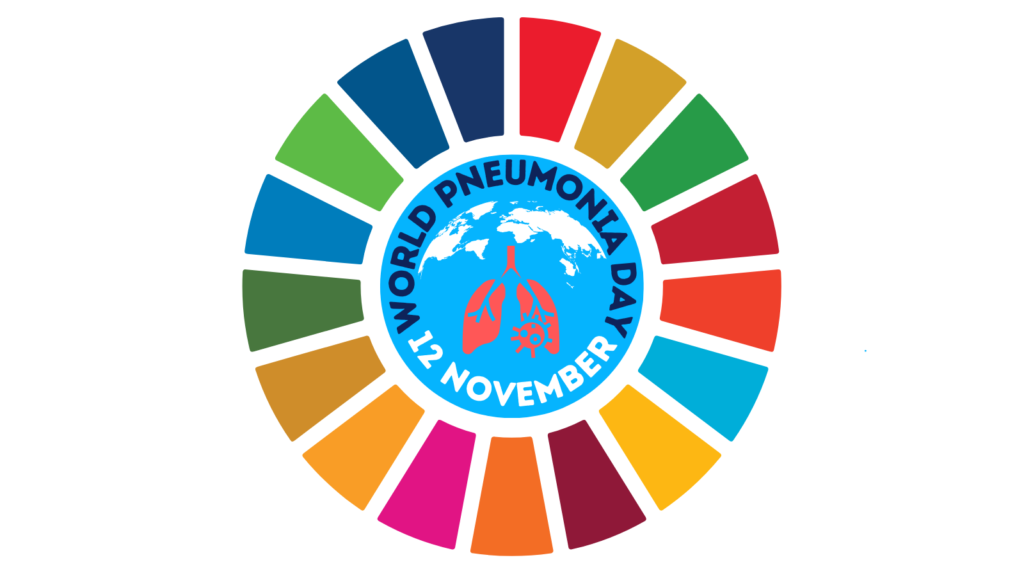
RESOURCES
Events
- Childhood Pneumonia & Quality of Care, Results 4 Development
- The Future of Pneumonia Prevention, IVAC/JHU
- The Double Burden: Pneumonia & COVID-19 and the race to close the oxygen access gap, Australian International Development Network
- World Pneumonia Day Conference on Pneumonia and Air Pollution, PneumoLight and Every Breath Counts
- Air Pollution, Climate Change & Health: Joining the Dots on World Pneumonia Day, COP26 WHO Health Pavilion
- Addressing the leading killer of children from a preventable cause and accelerating PCV coverage in Asia, Save the Children
- Pneumonia and the need for Cleaner Air & Climate Action, Lung Care Foundation, Indore, India
- Every Breath Counts Research Priorities Webinar
Country commitments
- India: Pneumococcal Conjugate Vaccine (PCV) available to all children across India
- Democratic Republic of Congo: Health minister sets up oxygen taskforce with aid agencies and the private sector to produce more oxygen in DRC’s 26 provinces
- Chad and Ethiopia – Ministries of Health agree to improve pneumonia control plans as part of broader child survival strategies
- Nigeria – Health Minister renews commitment to implement the Nigerian Integrated Pneumonia Control Strategy and Implementation Plan and the Global Action Plan on Pneumonia and Diarrhoea (GAPPD)
- Somalia: Health Minister announces more resources for child health and reaffirms commitment to PCV introduction and developing a pneumonia control strategy
Reports
- The Missing Piece: Why the Pandemic is an inflection point for Pneumonia Control, Every Breath Counts
- Pneumonia & Diarrhoea Progress Report 2021, IVAC, John Hopkins University
Newsletters
- Pneumo-Watch INSPIRING newsletter, Save the Children Nigeria
- Pneumo-Watch INSPIRING newsletter, 2nd edition, Save the Children Nigeria
- Pneumo-Watch INSPIRING newsletter, 3rd edition, Save the Children Nigeria
Articles
- Ending the Permanent Respiratory Disease Pandemic, Project Syndicate, Every Breath Counts
- Respiratory syncytial virus: promising progress against a leading cause of pneumonia, Lancet Global Health, Amy Ginsberg et al
Press releases
- Nigeria has highest number of air pollution-related child pneumonia deaths in the world, UNICEF Nigeria
- Call to increase funding for oxygen response, UNITAID
- Global Efforts must be strengthened to end the preventable burden of pneumonia, FIRS
- India completes national introduction of pneumococcal conjugate vaccine, Gavi
- Number of African Children receiving pneumonia vaccines falls for the first time in four years, Save the Children
Blogs
- Clean Air critical to reducing pneumonia deaths, Every Breath Counts Pneumonia and Air Pollution Scorecard 2021
- What pneumonia can teach us about COVID-19, PATH
- Investing in oxygen before the pandemic gave Ethiopia a head start in its COVID-19 response, CHAI
- Broken oxygen equipment cost children’s lives at hospitals in Kano, Nigeria. We developed a fix, CHAI
- Oxygen 101: An Explanation of the Oxygen Gap, Assist International
- Why we need medical gas companies to help close oxygen gaps, Access to Medicine Foundation
- Unitaid marks World Pneumonia Day and calls on all partners for more funding to the oxygen response, Unitaid
- Pneumonia takes the life of a child a minute – this is how most of these deaths can be prevented, UNICEF
- Clean Cooking Reduces Household Air Pollution- A Leading Cause of Pneumonia, HAPIN Study
Podcasts
Videos
- Sickness and survival in pre-COVID-19 Nepal. IVAC/Gavi
- Studying the effects of PCV in Kenya, Pneumococcal Conjugate Vaccine Impact Study, Kemri Wellcome Trust
The Promise of Reduced Dose Pneumococcal Vaccination for Children
Pneumonia is the leading infectious cause of death in children under five and, as a result, the pneumococcal conjugate vaccine, or PCV, is one of the most lifesaving vaccines. However, just six in every ten children are protected with PCV well below the global target...
17 March, 2024A2O2 Resource Library
The A2O2 Resource Library is a platform for all things oxygen - covering every aspect of the oxygen ecosystem from planning to equipment to patient care.
10 May, 2023You paid WHAT?
For the more than 400 million adults and children who get sick with pneumonia each year, the costs of treatment can be catastrophic - as individuals and families are forced to pay out-of-pocket for healthcare. Every Breath Counts is launching a new campaign to document these crippling costs.
09 December, 2022Antimicrobial resistance and pneumonia
How do we reduce inappropriate use of antibiotics for the treatment of pneumonia and close any remaining access gaps for pneumonia patients, especially children, who are missing out?
18 November, 20222nd Global Forum on Childhood Pneumonia
The 2nd Global Forum on Childhood Pneumonia built on the momentum for action generated by the first Forum in 2020, enabling countries to rapidly reduce child pneumonia deaths and accelerate achievement of the child survival SDG.
13 November, 2022Pulse oximeters that work for everyone
There is growing evidence that pulse oximeters do not work effectively on darker skin tones. This is unacceptable. Every Breath Counts has launched a petition to change this.
10 October, 2022


